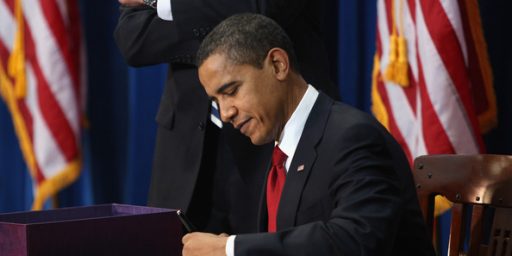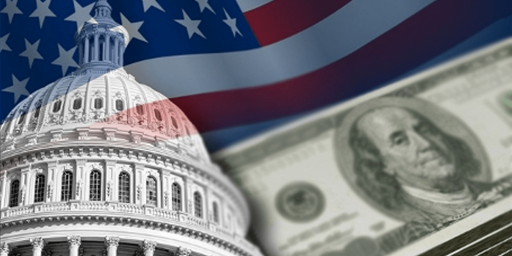The Best Anti-Stimulus Argument?
Matthew Yglesias thinks that Kevin Murphy’s argument as to why the fiscal stimulus package could be a bad idea is the best he has seen. What I want to know is what turnip truck did Matthew just fall off of? This is the argument most of the people who are not so keen on a fiscal stimulus package are making. Murphy’s argument boils down to: If the proportion of idle resources and the value of those idle resources is small enough and then they wont overcome the effects of government waste/inefficiency and deadweight loss.
And instead of providing empirical evidence that the numbers are such that fiscal stimulus is justified what do we get? Nothing but speculation from Brad DeLong and some nonsense about different forms of efficiency without explanation from Matthew. And I have to admit that Prof. DeLong’s assertion that government inefficiency is zero is amusing. Do we need to trot out the articles about the Pentagon simply losing track of tens of billions of dollars? The articles about how a good chunk of the funds in the current stimulus package wont be available until 2010 and later? Pshaw…why that actually represents government efficiency.
And lets not forget the lessons of public choice theory. Are we to expect the rich and powerful to idly by while nearly a trillion dollars are injected into the economy? Or are various special interest groups, industrial and commercial advocacy groups, large corporations, and city and state governments going to send in their lobbyists to try and get as much as they can? Yet from all this, there will be no inefficiencies?
Update: Good quote from James Hamilton,
On the other hand, if everybody and their grandmother is lining up for a bailout, and pulling political strings ([1], [2]) to make sure they get it, I read that as prima facie evidence that the taxpayers’ interests are not being properly represented.
This is absolutely correct but the prevailing attitude right now is that deficits and the tax payer don’t matter at all. Take for example Paul Krugman’s erroneous view that deficits in the current situation aren’t that big a deal because it is money we largely owe to ourselves. This kind of boneheaded thinking is not good and yes, we have to think about the taxpayers. Maybe one can argue that being overly cautious about fiscal imbalances right now is not appropriate, but saying that they simply aren’t important at all right now and we’ll sort it out later when other really large fiscal imbalances are starting to become an issue is…short sighted in the extreme.





Perhaps MY is impressed with the mathematization of Dr. Murphy’s presentation.
I think the more interesting part of his presentation is his argument that the conditions under which the stimulus plan is being proposed are likely to minimize the efficiency of the plan.
Steve:
I am sure I have missed it, so if you could reply with it a link it would be great… but what exactly do you think should be the response to the current economic turmoil? I keep seeing you attacking the bailout and stimulus proposals. But what do you propose instead? Just tax cuts? For whom and of what size? And doesn’t that also run the problem of huge deficits? And how do you get around the challenge that in the current environment most people will just save/deleverage? Would it be better to do nothing? And why is that?
–BF
I operate from the view that the government will do something and call it “stimulus.” Therefore it would be best to focus on which “something” is best. In personal order of preference:
1. Unemployment benefits lengthened.
2. Income and/or payroll taxes cut.
3. Assistance to states/local communities to maintain previous level of infrastructure spending.
4. Improvement of electrical grid.
5. Improvement of dangerous roads, bridges, dams.
Actually PD, that isn’t half bad and probably a whole lot less expensive that the stuff we are seeing now.
The unemployment benefits and payroll taxes part will likely give you lots of “bang for your buck”. Also, cutting the employer side of payroll taxes would make hiring workers, at least while the tax is low/on hiatus, more attractive.
The roads, electrical grid also are probably things that we’d end up spending money on anyways so what the heck.
As for propping up state governments…I’m a bit undecided here. In CA part of the problem is that the State politici…errr douchebags are completely in the pocket of special interest groups and keep throwing money at them (e.g. the fearsome prison guards union/lobby). So while that looks good, I’d hate for the money to keep being pumped into groups that have already gotten sweetheart deals in the past. Its belt tightening time and those who’ve sucked off the public teat, at least here in CA, need to be the first to be weened off and fast.
Bernard,
See PD’s points 1, 2, 4 and 5. Depending on 3 I might go for it. But the current bailout and the do anything mentality needs to Goddamned go and right now.
Here is an idea under the “anything and everything rhetoric”: we kill every other person. With only half the population per capita GDP doubles.
Obviously that isn’t a serious option…but then again “anything and everything” rhetoric isn’t serious either. Its populist nonsense.
Oh and Bernard, if there is no multiplier…yeah, doing nothing might be the better option. That is the point of the multiplier, if it is greater than 1 then fiscal stimulus might work if it gets into the economy soon enough. If that doesn’t happen then it is equivalent to doing nothing or worse.
There is always the argument that money to states and local government should be conditioned on fiscal reform in their pension system. But I don’t see that happening . . .
My third point is difficult for me to describe, but it is this: State and local government are reducing spending on infrastructure because revenues are decreasing. The reduced spending contributes to the economic problems, but unlike, say the auto industry, government spending is presumptively in the public good. Maintaining a given level of employment/spending on infrastructure may not be “stimulative,” but it falls into the do no harm category.
Could you cite evidence that there is no multiplier effect? Or do you mean that in the current circumstance there is unlikely to be any? Because I think the notion that there is never a multiplier effect, if demonstrated empirically, would probably win you a Nobel in Economics as it would overturn two generations worth of work in the field of macro-economics.
The issue with waste is this… it is waste in the sense of giving you less goods than you expected for the investment, but is not necessarily a waste if the goal is simply to pump money into the economy.
Seems to me your approach — the good old tighten the belts argument — would almost certainly deepen the recession, though it might arguable make us healthier in the long run. I just don’t know that the short-term costs are something we can endure politically.
It is nice to hear conservatives become concerned about deficits again, at least until they get back into the presidential office.
Steve
“I think the more interesting part of his presentation is his argument that the conditions under which the stimulus plan is being proposed are likely to minimize the efficiency of the plan.”
Classic Murphy. Brings back memories. However there is another Chicago economist who made basically the same point. A certain M. Friedman.
You really want to compare what Republicans spend vis a vis Democrats? If it were not for Democratic inspired programs the nation would not be in debt. The concept government is the answer to our financial ills will work as well today as it did when it failed in the 1930’s. Only the economy and fix the economy. Sometimes balloons just have to pop.
Bernard,
There is evidence that the multiplier has a range of values. Greg Mankiw has been posting a fair amount on this. One point is the research by Christina and David Romer.
And keep in mind the multiplier needs to work while we are in a recession. Having it work after the recession is over and we are in an expansionary phase could induce the Fed to ratchet up interest rates and even percipitate another recession to keep inflation in control. So…it is also incumbent upon “your side” (so to speak) to show that,
1. The multiplier is larger than 1 (and I’d say significantly so, sure 1.001 is greater than 1, but big deal, now 1.25 that would be a good multiplier).
2. It will get into the econommy before the recession is over.
Building bridges in 2011 is probably too late. We may still need those bridges, but don’t call it fiscal stimulus.
No, it is about making sure that the money goes to those programs/individuals/etc. that will give the highest multiplier. Suppose you have three catagories of spending, A, B and C. Now if A has a multiplier of 1.25, B 1.1 and C 1 we’d want A to get the bulk if not all of the money. But if C has a powerful lobby and ends up getting all the money then why bothter.
The California state government budget is a complete mess. Like I noted various special interst groups have been living very large at the public’s expense. Now there is a massive deficit, falling revenues, and people are already heavily taxed. Now they are looking to tax items that are likely to really piss people off (so called “sin” taxes, or fun taxes since they are going to add on extra taxes for golfing and amusement parks). The douchebags who sit on their fat asses in Sacramento also believed the hype that real estate prices would go up, up, and up. So yeah, there needs to be a fundamental shift to address this problem…which was a problem even during strong economic times. It is just that the strong economy made it easier to sweep the issue under the rug with temporary measures.
Oh and these would be Democrat douchebags by the way. You know, that responsible party of adults who make only wise and good decisions. Can’t blame this one on the Republican douchbags…although I’m sure some asshats will make a strong effort.
steve,
I’m not a conservative. Try not to pigeon-hole people before you really get to know them. I’ve been critical of Bush’s big government/big spending ways for sometime.